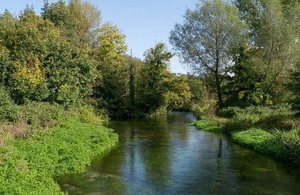Join us for an #Agrichat session on water abstraction reform
Defra will be taking part in a Twitter discussion on water use on farms and abstraction reform.

We’re going to be taking part in an #AgriChatUK discussion, talking about water use on farms and abstraction reform. #AgriChatUK is the Twitter home for UK farming discussions, with sessions on dedicated topics held every Thursday evening.
Why don’t you join us? Follow the session on Twitter using #AgriChatUK, and if you want to join in the debate, make sure you use #AgriChatUK in your tweet. If you want to know more about Abstraction Reform, please read the information below.
The session will run between 20:00 - 22:00 on Thursday 7 November 2013.
Get in contact with us at abstraction_reform@defra.gsi.gov.uk or @DefraWater
Background
Farming water use and abstraction
Farmers and growers currently use abstracted water (ie water taken direct from rivers or aquifers) for a range of activities, mainly irrigating field and nursery crops, watering livestock and washing down machinery. Irrigation mainly happens in areas of low rainfall and sandy soils such as East Anglia to contribute to crop quality and improve yields. About 50% of abstracted water for irrigation is used for potato growing mainly to ensure high crop quality. Farmers and growers account for less than 1% of abstracted water in England and Wales but amount to 10 thousand abstractors - about half of all abstractors. Although amounting to a small % of abstraction, irrigation does tend to happen when flows are lowest in the summer so can be quite significant for particular catchments. If abstraction levels are too high they can impact on the quality of the water and habitats in our rivers.
Future challenges and abstraction reform
The recent drought before it started raining hard in 2012 will be fresh in farmers’ minds. In the future, water could become generally scarcer as the climate changes and population grows. This presents a significant challenge and the UK Government set measures in Water for Life in 2011 to meet this challenge. Much of this involved building a more efficient and resilient public water supply through increased competition and promoting improved regional networks. However a key area identified was reforming the abstraction management system. It was recognised that our current system, introduced in the 1960s was not designed to meet these future challenges. It is bureaucratic and inefficient, reducing our ability to get the most out of water resources while protecting the environment.
Since 2011 we have therefore been exploring how best to reform the abstraction management system working with abstractors and their representatives. This involves a stakeholder advisory group on which the NFU, CLA and HTA are represented as well as a large number of workshops that many farmers and growers have attended. We have particularly focussed on a number of catchment case studies and developed models to explore how reform options might affect abstracters and the environment between 2025 and 2050 under different climate and socio-economic scenarios.
What could this mean for farmers?
We are seeking to develop options to make the most of our water in our rivers and groundwater while protecting the environment in a way which is fair and adaptable to future uncertainty, all at a reasonable cost. Key proposals include moving from seasonal licences to ones linked to flows and making trading of water easier. This could help farmers to fill up their reservoirs as they can make use of high flows in summer or winter and make it easier to trade their access to water when they don’t need it. Farmers and growers could even become ‘farmers of water’ by investing in storage to supply others. We are also proposing to remove time limits to licences but make all access to water subject to review where there are clear risks to the environment.
Next steps
We will be formally consulting on reform options in December 2013. We hope then to make decisions in order to legislate after the next election. This will then allow us to implement changes around the end of the decade.